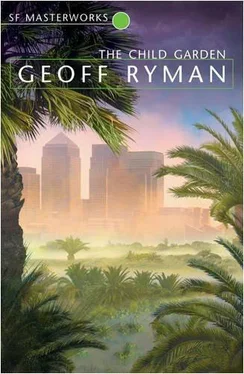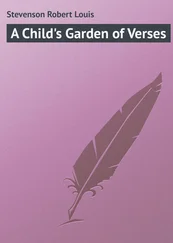Because, sighed Bob in the lines and in her mind, we have discovered that the viruses destroy talent.
Take Rolfa, he said, now Rolfa, we couldn’t let that happen again. We Read Rolfa and look at her. Rolfa, this marvellous talent. We destroyed Rolfa. And your love for Rolfa, it pulls you up love, it pulls you along and pulls things out of you no one could have known existed. We couldn’t destroy that, could we?
You need me to love Rolfa, because it makes me work?
Not only that.
Bob showed her the rainfall of the flowers, her twenty-two billion roses.
The Consensus needs someone who can conceive of it. It wants to travel too. It will need you, to bear its image.
Where?
To the stars, said Bob. The Consensus wants you for an Angel. It wants you, Milena, to carry it out there, its image, to meet the Other when it comes. The viruses, you see, love. You didn’t have them, but you had to keep up with them. So you forced yourself through all those years in the Child Garden. You forced yourself to do alone what the viruses do for everyone else. You forced yourself to grow a capacity for memory, for holding images, that no one else has.
All my history. All my self. It’s to be used by the Consensus.
Bob. I’ve got nothing. You’ve left me with nothing. Why did you tell me this?
Because someone with nothing needs to know that. She needs to get something. What she needs to do, said Bob the Angel, is marry Mike Stone.
So Milena went up, and Milena went down and Milena married Mike Stone. Hop, skip, and jump.
CHAPTER FIFTEEN
People’s Artist
(The Whole Truth)
Milena remembered being on a platform in the gardens of the Embankment with her husband sitting beside her. On her other side there was some grand personage, whose name she had deliberately forgotten. It was July of the blustery summer, still plagued by high winds, but warm, warm at last.
Milena stepped forward from her folding chair, into the area of the cube that would magnify her. It would magnify her voice and her features, turn her into an artefact. Behind her there was a flapping of banners, long red banners, with medallions of socialist heroes. In front of her were red banners hanging from lamp-posts, buffeted by the wind. The trees moved and the shadows of the clouds moved, as if everything were stirring, alert and alive.
There were rows of faces in chairs. Milena knew many of them. Some of the faces were swollen with pride, proud of her, proud of themselves for knowing her. Others were slightly disgruntled with the boredom of doing a duty, forgivable under the circumstances. Others were sceptical and anticipatory at once. Would this tiny, drab-looking woman have anything interesting to say?
I think I have, thought Milena, looking up at the sky.
All around her was the silence. She could feel it. Silence and light being exchanged without human notice. She looked at the earth, still there under the buildings and the pavements. Besides performing a function, the buildings and pavements seemed to her to embody ideas and ideologies. Milena simply smiled, in the silence.
Milena kept on smiling for many moments, looking at the red banners and trying to really understand why they were there and what they might mean for her. The audience began to shift. Then, as she kept smiling, calm and feeling no need yet to respond or to speak, the audience began to smile with her, to chuckle.
‘So,’ she said finally. ‘Here I am.’
Another long pause as the wind flapped. The banners sounded like the wings of birds. Milena knew what she wanted to do then.
There was a text that she had assiduously prepared, with a careful line of argument, discussing the need for a socialist artist to work for socially defined ends. She held the text in her hands. It was typed, on gold-embossed paper. Paper was still a way of making something important. It meant tradition. There had been copies of the speech waiting on people’s chairs, weighted down by rocks to keep them there.
Milena found she was impatient with the paper. She set it free. She threw it up into the wind. It danced, and spiralled, rose up in the updraft of the Shell, spun around dizzyingly in the air. ‘Wheee!’ said Milena. No order. The audience laughed.
‘I wonder,’ she said, ‘what this title People’s Artist really means. I’ve always found that I have too little to do with people. My work has taken over my life. I wanted it to take over my life. It was as if I could fold myself up and keep myself safe in a drawer, very tidily, unseen. I wouldn’t have to worry about it then. Or, to be honest, be worried by other people. In the end, I was. Worried by people. So here I am. Out.’
A mild, concerned chuckle. Just how embarrassing and personal was this speech going to get?
‘I suppose the People part means that my work is used for political ends. It makes people feel and think in the ways they are supposed to feel and think. It’s not much different from a virus.’
An unexpected burst of laughter, then. It swelled.
‘Except that I always think of the great socialist ends after everything else.’
A warmer, but less certain, shorter laugh. Is this going to get dangerous?
‘I thought when we were doing the out-plays that they were a way to make people love themselves and the London they live in. It seems to me that London now is at least as interesting as London was when all those plays were written. I wanted all the Estates to be proud of each other: the Reefers, the Cordwainers, the Tugboys, the Slump Bobbers. They’re part of London too. I did not, however, set out to make them love two hundred foot tall Crabs.’
A grateful laugh now, of relief. This isn’t going to veer off in any funny direction. This is going to work.
‘I think people should love giant Crabs, particularly if they sing well.’
Pause.
‘Those of us who work at the Zoo often have to love giant singing Animals.’
A larger laugh. But the trees whispered, that’s enough.
‘You can get too high-minded. People should be easier on themselves. Life isn’t high-minded. If it’s got a mind at all, then it’s out of it. Attack was just fun. It was an excuse to get in as many holograms as we could.’
We, meaning you and Thrawn, the trees sighed in and out.
‘Sometimes fun can cost lives. The woman I worked with on Crabs is no longer with us. The woman who set all of Divina Commedia to music is no longer with us either. I used to think I destroyed them both. Now I think that to blame myself is just another way of making myself too important.
‘The most socialist thing I ever did, the best thing I ever did, was trying to get people to help the sick instead of shutting them away and burning the bodies. I had a lot of help, from Milton John, from Moira Almasy. And that was nothing to do with being an Artist.’
Milena stopped, visibly wondering what she was going to say next, taking her time.
‘Am I an Artist at all? I don’t know what the word means. I do what I can, in the way I can do it, when I have an idea. I don’t know where the ideas come from, except that I don’t have them. By that I mean the "I" that I know doesn’t seem to have them. The "I" that I know keeps trying to think of ideas and they don’t come. The ideas seem to come of their own accord, in their own time, without me. So I can’t really claim any credit for them. Or responsibility, either. Life just gives them to me. You, my friends, the ones I can see in the front row. You gave them to me. And the city, and the history that made it and made me too. So who is the Artist, then? Is there an Artist at all?’
Suddenly she grinned.
‘Maybe we should be giving this award to each other, just for being here. The only way to be a People’s Artist is to be as private as you can. That’s when you touch something that isn’t just you.’
Читать дальше












